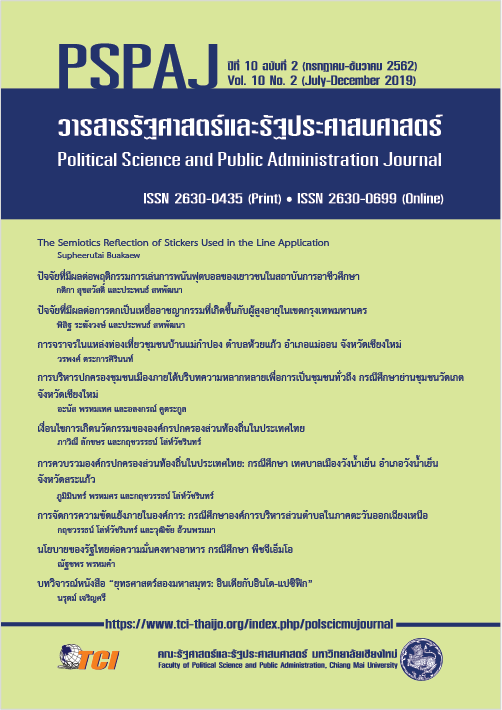Thailand’s State Policy on Food Security: A Case Study of GMOs Crops
Main Article Content
Abstract
The study focused on Thailand’s State Policy after the food security norm had been set by the provided common definition in the international conference of FAO. The objectives were to study situation and influence on food security from Thailand’s GMOs policy and examine hypothesis that the diffusion of international ideas, norms and policies influence on policy making. Purposive Samples were a scholar who studies genetic engineering, an international non-profit environmental organization, a farmer who pays attention on GMOs and authorized officials who make policy decision. Data were collected by in-depth interviews. Documentary analysis and analytic induction were used.
The findings showed that Thailand can still cultivate seasonally. Thailand also has enough food for domestic consumption and also has potential to export. If Thailand allows GMOs crops, it may cause export problems. The result did not support the hypothesis on GMOs crops because Thailand relied on domestic knowledge to make policy decision but it supported on food security norm because there was a draft of food security strategic plan that Thailand had brought guidelines from others.
The study also suggested that government should:
(1) Set GMOs crops policy clearly that they would promote the use of full genetic engineering technologies or some of them or they do not allow to use such technology.
(2) Study the information related to GMOs crops extensively in order to make decision.
(3) Publish information about GMOs crops both in positive and negative effects on food security, biodiversity, culture and folk wisdom including the export economy.
(4) Be aware of distortion of facts from the beneficiaries on state policy
Article Details
- เนื้อหาและข้อมูลที่ลงตีพิมพ์ในวารสารรัฐศาสตร์และรัฐประศาสนศาสตร์ถือเป็นข้อคิดเห็นและความรับผิดชอบของผู้เขียนบทความโดยตรง ซึ่งกองบรรณาธิการวารสารรัฐศาสตร์และรัฐประศาสนศาสตร์ ไม่จำเป็นต้องเห็นด้วย หรือร่วมรับผิดชอบใดๆ
- บทความและข้อมูล ที่ได้รับการตีพิมพ์ในวารสารรัฐศาสตร์และรัฐประศาสนศาสตร์ ถือเป็นลิขสิทธิ์ของวารสาร หากบุคคลหรือหน่วยงานใดต้องการนำข้อมูลไปใช้ประโยชน์ในทางวิชาการ ขอให้อ้างอิงแหล่งที่มาด้วย
References
กรีนพีซสากล. (2553). อุตสาหกรรมข้าวไทยตกอยู่ในอันตราย: ความเสียหายที่เกิดขึ้นเมื่อข้าวไทยปนเปื้อนจีเอ็มโอ. สืบค้นเมื่อ 23 มีนาคม 2559, จาก http://www.greenpeace.org/seasia/th/PageFiles/164310/Thai-Rice.pdf
กลุ่มศึกษาข้อตกลงเขตการค้าเสรีภาคประชาชน. (2558). ความตกลง TPP สร้างผลกระทบอย่างกว้างขวางการตัดสินใจเข้าร่วมต้องผ่านการตัดสินใจโดยประชาชนส่วนใหญ่. สืบค้นเมื่อ 9 ตุลาคม 2558, จาก http://www.ftawatch.org/node/49875
คมชัดลึกออนไลน์. (2558). 'พ.ร.บ.จีเอ็มโอ' ข้อดี-ข้อเสีย. สืบค้นเมื่อ 3 กุมภาพันธ์ 2559, จาก http://www.komchadluek.net/detail/20151209/218286.html
โจน จันได. (2555). งานเก็บเมล็ดพันธุ์คืองานสุดท้ายในชีวิตผม. กรุงเทพฯ: ภาพพิมพ์.
ชูศักดิ์ วิทยาภัค. (2547). การอนุรักษ์สิ่งแวดล้อม: เอกสารคำสอน Geo 154104 = Environmental conservation. เชียงใหม่: ภาควิชาภูมิศาสตร์ คณะสังคมศาสตร์ มหาวิทยาลัยเชียงใหม่.
ธันยวัฒน์ รัตนสัค. (2546). นโยบายสาธารณะ. เชียงใหม่: คนึงนิจการพิมพ์.
นนทกานต์ จันทร์อ่อน. (2557). ความมั่นคงทางอาหารของประเทศไทย. กรุงเทพฯ: สำนักวิชาการสำนักงานเลขาธิการวุฒิสภา.
นเรศ ดำรงชัย. (2543). ข้อตกลงระหว่างประเทศที่เกี่ยวกับ GMOs และข้อเสนอแนะเพื่อเตรียมความพร้อมของประเทศไทย. กรุงเทพฯ: โรงพิมพ์มหาวิทยาลัยธรรมศาสตร์.
พรทิพย์ ชิณสงคราม. (2548). ระบบนิเวศ: จีเอ็มโอ...ผลกระทบต่อสิ่งแวดล้อม และสายใยอาหาร. กรุงเทพฯ: สำนักวิชาการ มหาวิทยาลัยกรุงเทพ.
พลศักดิ์ จิรไกรศิริ. (2557). จริยธรรมในนโยบายสาธารณะ. สืบค้นเมื่อ 17 กุมภาพันธ์ 2559, จาก http://hq.prd.go.th/plan/download/article/article_20140820132853.doc
มูลนิธิชีววิถี. (2558). นักวิชาการชี้การเข้าร่วม TPP ทำให้ประเทศไทยต้องเข้าเป็นภาคีในสนธิสัญญาด้านทรัพย์สินทางปัญญานับสิบฉบับส่งผลกระทบต่อเกษตรกรรวมไปถึงธุรกิจการเกษตรท้องถิ่น. สืบค้นเมื่อ 20 พฤศจิกายน 2558, จาก http://www.biothai.net/node/30283
มูลนิธิเพื่อสันติภาพเขียว. (2552). สิทธิเหนือสิ่งมีชีวิต. สืบค้นเมื่อ 13 เมษายน 2559, จาก http://www.greenpeace.org/seasia/th/campaigns/gmos/ge-agriculture-genetic-pollution/patents-on-life/
มูลนิธิสืบนาคะเสถียร. (2558). พืช GMO กับพืชทั่วไป อยู่ร่วมกันไม่ได้. สืบค้นเมื่อ 12 เมษายน 2559, จาก http://www.seub.or.th/index.php?option=com_content&view=article&id=1659:seubnews&catid=5:2009-10-07-10-58-20&Itemid=14
วิฑูรย์ เลี่ยนจำรูญ. (2553). โลกาภิวัฒน์กับความหลากหลายทางชีวภาพ. กรุงเทพ: มูลนิธิชีววิถี.
วิรัลพัชร ประเสริฐศักดิ์. (2558). ความมั่นคงทางอาหาร: จากพัฒนาการเกษตรสู่เศรษฐกิจพอเพียง. สืบค้นเมื่อ 17 พฤศจิกายน 2558, จาก http://copag.msu.ac.th/journal/filesjournal/n5-2/11.pdf
สมาคมทรัพย์สินทางปัญญาแห่งประเทศไทย. (ม.ป.ป.). ความรู้ทั่วไปเรื่องสิทธิบัตร – สิทธิบัตรคืออะไร. สืบค้นเมื่อ 13 เมษายน 2559, จาก http://www.ipat.or.th/index.php?option=com_content&view=article&id=278:25-06-53&catid=46:aut2&Itemid=14
สำนักงานนโยบายและแผนทรัพยากรธรรมชาติและสิ่งแวดล้อม. (2555). ความหลากหลายทางชีวภาพ. สืบค้นเมื่อ 13 เมษายน 2559, จาก http://www.onep.go.th/index.php?option=com_content&view=article&id=2924:2012-01-25-08-08-11&catid=106:2011-12-01-04-18-51&Itemid=220
สิทธิพล วิบูลย์ธนากุล. (2547). GMOs ภายใต้ระเบียบเศรษฐกิจระหว่างประเทศ. กรุงเทพฯ: โรงพิมพ์มหาวิทยาลัยธรรมศาสตร์.
สิรินทิพย์ นรินทร์ศิลป์. (2554). สถานการณ์ความมั่นคงทางอาหารในอาเซียนและประเทศสมาชิกต่างๆ. สืบค้นเมื่อ 4 กุมภาพันธ์ 2558, จาก http://www.polsci.tu.ac.th/fileupload/45/40.pdf
เอกรัฐ เลาหทัยวาณิชย์. (2552). หลังสมัยใหม่: การสร้างภาพแทน โลกาภิวัตน์ การบริโภค และทุนวัฒนธรรม. สืบค้นเมื่อ 4 กุมภาพันธ์ 2558, จาก http://v1.midnightuniv.org/midnighttext/0009999810.html
Carrington, D. (2014). Britain's Food Self-sufficiency is in Long-term Decline, Warnfarmers. Retrieved April 17, 2016, from http://www.theguardian.com/environment/2014/aug/07/britain-food-self-sufficiency-decline-imports-nfu
Food and Agriculture Organization of the United Nations. (2005). What’s Agrobiodiversity?. Building on Gender, Agrobiodiversity and Local Knowledge. Retrieved July 27, 2019, from http://www.fao.org/3/a-y5956e.pdf
______. (2006). Food Security. Policy Brief, (2). Retrieved November 17, 2015, from http://www.fao.org/forestry/13128-e6f36f27e0091055bec28ebe830f46b3.pdf
Gilardi, F. (2012). Transnational Diffusion: Norms, Ideas and Policies. In Carlsnaes, W., Risse, T., & Simmons, B. A. (Eds.). Handbook of International Relations. (pp. 453-477). Thousand Oaks: SAGE Publications.
Hofmann, F., Otto, M., & Wosniok W. (2014). Maize Pollen Deposition in Relation to Distance from the Nearest Pollen Source under Common Cultivation - results of 10 Years of Monitoring (2001 to 2010). Retrieved April 13, 2016, from https://enveurope.springeropen.com/articles/10.1186/s12302-014-0024-3
Jepperson, R. L., Wendt, A., & Katzenstein, P. J. (1996). Norm, Identity and Culture in National Security. In Katzenstein. P. J. (Ed.). The Culture of National Security: Norm and Identity in World Politics. (pp. 33-75). New York: Columbia University Press.
Ministry of Agriculture, Forestry and Fisheries. (2010). Chapter 1 toward a Securing Stable Food Supply. Retrieved April 17, 2016, from http://www.maff.go.jp/e/annual_report/2010/pdf/e_1.pdf
Newson Japan. (2015). Japan Food Self-sufficiency Rate Flat at 39 pct. Retrieved April 17, 2016, from http://newsonjapan.com/html/newsdesk/article/103967.php
Stone, D. (2014). Is Your Country Food Independent?. Retrieved June 24, 2018, from https://www.nationalgeographic.com/people-and-culture/onward/2014/04/13/is-your-country-food-independent/
The guardian. (2014). Britain's Food Self-Sufficiency is in Long-term Decline, Warn Farmers. Retrieved April 17, 2016, from http://www.theguardian. com/environment/2014/aug/07/britain-food-self-sufficiency-decline-imports-nfu.
United Nations. (2015). Sustainable Development Knowledge Platform. Retrieved February 14, 2016, from https://sustainabledevelopment.un.org/sdgs

